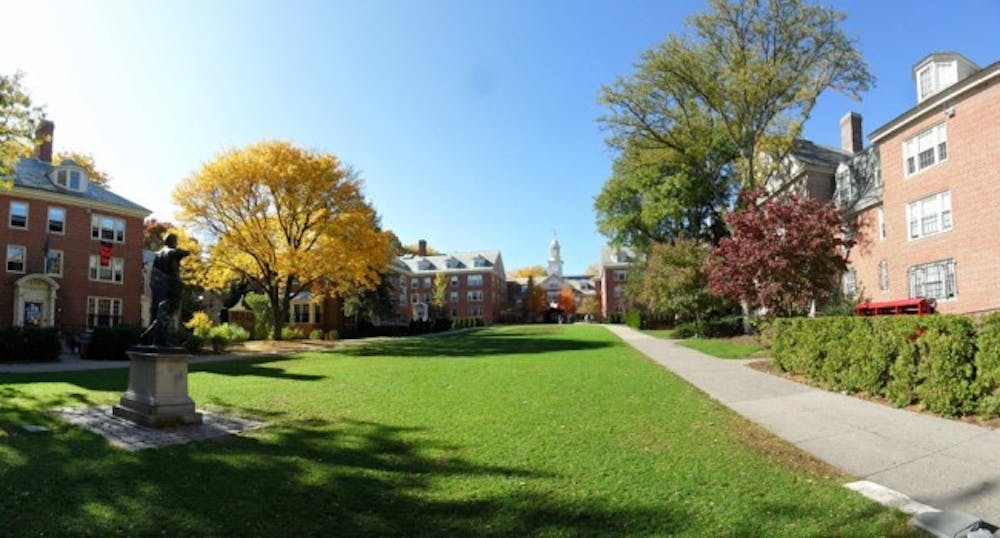Of 160 juniors returning from study abroad in the fall, 11 students were assigned to temporary housing in kitchens and lounges before the semester began, compared to 18 students last year, said Richard Bova, senior associate dean of residential life.
Four students who studied abroad in the fall are still living in temporary housing and are on schedule to move into permanent housing this week, Bova said, adding that the recent blizzard delayed the process.
Though the Office of Residential Life’s goal was not to place any students in temporary housing, having “only four is pretty good,” he said.
One kitchen in Vartan Gregorian Quad still houses a student, creating problems for the dorm’s residents. “I’m very frustrated,” said Nicolas Schank ’16, who is off meal plan and had relied on the now-occupied kitchen to prepare meals. “We basically signed a lease over the expectation that we would have a kitchen on our floor,” Schank said. “It’s literally ResLife’s only job to make sure that people can live somewhere,” he said, adding that “the fact that they did not plan for what they knew to be this enormous event ... is just stupid.”
Returning juniors who did receive housing expressed frustration with the last-minute uncertainty and lack of clarity in the process. “Everybody was super stressed,” said Courtney Bergh ’16, who studied abroad in Barcelona last semester. ResLife could be more communicative and clear, she said.
“I understand that (ResLife was) bombarded with a lot of questions, but I think that overall there should be a much better system,” said Melissa Hill ’16, who spent the fall semester in Spain. “It was in shambles.”
Housing issues arise when students’ plans are not known to ResLife or when the numbers of departing and returning students are not equal, Bova said. This year, ResLife did not have official confirmation of those numbers until Jan. 7. “It would be inappropriate for us to give away students’ spaces (that) had not come through officially on University departure lists,” Bova said. Other students may choose to leave or return after the Jan. 7 deadline, creating further complications, he added.
These numbers are different every year, so the number of juniors placed in temporary housing fluctuates, Bova said. Some years have fewer problems than others, he added.
On Jan. 12, five days before students were allowed to move in and five days after ResLife received confirmation of its official numbers, ResLife sent returning juniors an email offering them off-campus permission for the spring semester. Students were required to respond within 24 hours in order to be considered. They then had another 24 hours to inform ResLife of their new address if granted permission.
The possibility of off-campus permission should have been apparent earlier, Hill said, adding that finding off-campus housing within such a short time frame is very difficult, she added.
Sixty-two juniors received off-campus permission for the spring, Bova said. About half of them requested permission in response to the Jan. 12 email, and the rest appealed to ResLife for off-campus permission due to “changing circumstances,” he said.
ResLife had to move more students than usual this year due to Phi Kappa Psi’s loss of University recognition and program housing. But “it worked out well,” Bova said. “It binds things up a little bit, but it was not an overwhelming problem for us.”
As the student body grows under President Christina Paxson’s P’19 strategic plan, “Building on Distinction,” more juniors may move off campus in the future — the undergraduate student body will expand by one percent each year for the next 10 years. “We will adjust our off-campus numbers to reflect the growth, if any, in the student body,” Bova said. “We always balance that with the enrollment model. That has been our practice for the past 15 years, and it’ll still be the same practice.”
A University committee is looking at the implications of a larger student body for housing and other “critical areas of campus life,” said Margaret Klawunn, vice president for campus life and student services. After identifying potential areas of concern this fall, the committee, led by Dean of the College Maud Mandel, plans on developing a more detailed report by the end of the spring semester. At that stage, the University will be able to determine whether and how housing policies will need to change, Klawunn said.
But the expansion will not affect the number of juniors placed in temporary housing each year, Bova said. “It is never our plan or our goal to have anyone in temporary spaces.”
There is some room for growth in the off-campus population, Bova said, adding that each year around 30 juniors request off-campus permission but do not receive it.





